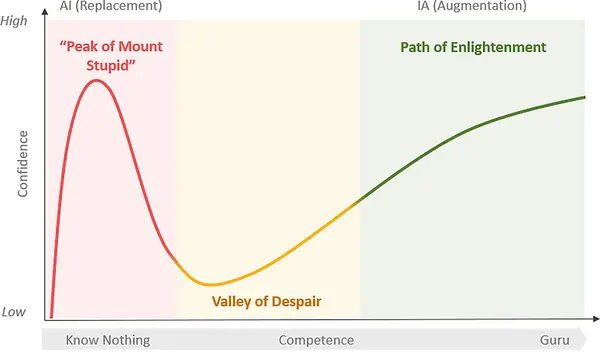 We're in the AI hype cycle
We're in the AI hype cycle
AI may be headed for a trough of disillusionment, but plan for the slope of enlightenment.
We're seeing a lot of back and forth discussion about AI these days. Is generative AI the solution to every IT workflow? Can generative AI automate and streamline processes while reducing costs? Or is generative AI in a "hype bubble" like the dot-com era of the late 1990s, destined for a crash?
Certainly we can't ignore some of the risks with generative AI. The environmental impact of AI is a real issue; with increased AI usage comes a corresponding increase in electrical demand and water consumption. Hallucination and copyright infringement are also real issues.
The US Copyright Office notes that "Generative AI models sometimes output material that replicates or closely resembles copyrighted works" and "Such outputs likely infringe the reproduction right and, to the extent they adapt the originals, the right to prepare derivative works."¹ (May 2025)
IBM highlights several notable examples of AI hallucination including "Google's Bard chatbot incorrectly claiming that the James Webb Space Telescope had captured the world's first images of a planet outside our solar system" (it didn't) and "Meta pulling its Galactica LLM demo in 2022, after it provided users inaccurate information, sometimes rooted in prejudice," observing that "While many of these issues have since been addressed and resolved .. the use of AI tools can have unforeseen and undesirable consequences."
But is AI use doomed to failure? I don't think so. Note that every new technology goes through a kind of "hype cycle." Technology research firm Gartner has codified this into their research using a Hype Cycle with several predictable phases: the Trigger phase, followed by a "Peak of Inflated Expectations" which then turns to a "Trough of Disillusionment" when the industry realizes that the new technology could not deliver on those inflated expectations. Technologies that survive this dip evolve towards a "Slope of Enlightenment" before reaching a "Plateau of Productivity."
AI researchers French and Shim refer to this as a kind of Dunning-Kruger Effect in a different context but similar outcome, describing the curve using labels like "Peak of Mount Stupid" and "Valley of Despair" and "Path of Enlightenment."² (2025)

The question for IT leaders is "where are we on this curve?" You will find different answers to this question, depending on perspective. I believe we are still in the "peak" area, probably past the apex heading towards a dip.
But this isn't to say that generative AI is about to pass its time, although we are certainly headed towards an "awakening" when organizations realize that AI will be unable to fulfill the overinflated promises. That will be the "dip" I refer to.
At the same time, generative AI has been transformative to many organizations. For example, application developers are often able to leverage AI effectively to help identify bugs, propose solutions, and write test cases. In other areas, AI has demonstrated a strong capability to summarize existing content, such as highlighting key points in documents and providing overviews based on written notes. This seems to show that AI has value to organizations.
There will be a dip in how organizations approach generative AI, but wise IT leaders will look to the slope and plateau that follows to see how AI might benefit their organization in the long term. Eventually, the AI industry will minimize or solve hallucination, and reduce energy consumption. That's the target to keep in mind.
Experiment now and identify how AI can be productive for your teams, and make plans to ride out the dip, but also to climb the slope of enlightenment when the AI industry stabilizes.
¹ Copyright and Artificial Intelligence: A Report of the Register of Copyrights. "Part 3: Generative AI Training." (May 2025). United States Copyright Office.
² French, A. M., & Shim, J. P. (2025). From Artificial Intelligence to Augmented Intelligence: A Shift in Perspective, Application, and Conceptualization of AI. Information Systems Frontiers, 27(4), 1345–1366. doi.org/10.1007/s10796-024-10562-2
